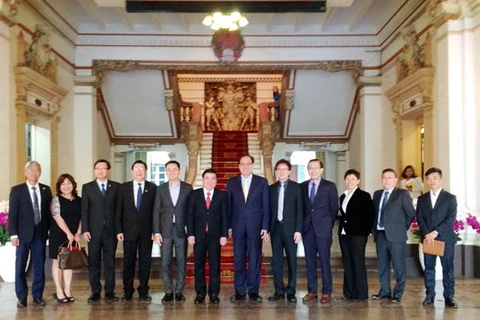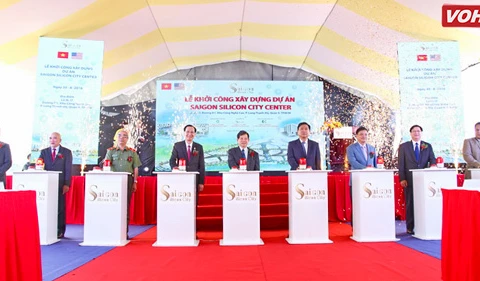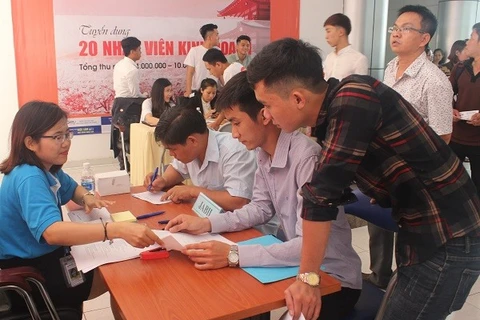HCM City (VNA) – Prime Minister Nguyen Xuan Phuc urged the Saigon Hi-tech Park (SHTP) to develop itself into a Silicon Valley in the region during a ceremony marking its 15th founding anniversary in Ho Chi Minh City on October 29.
Expressing his impression of technological industrial output in the park, which is three times higher than those in industrial zones, he said the 12th National Party Congress also highlighted the need to develop science-technology, attract technological transfer from foreign-invested enterprises and develop high-tech zones in advanced models.
The SHTP must become a high-tech research and development centre, train a contingent of staff with leading quality, develop a smart urban area and high-tech incubator, contributing to turning Ho Chi Minh City into the first smart urban area in the country, he said.
To achieve such goals, he asked the municipal authorities, ministries and agencies to make the Saigon Hi-tech Park a special technical-economic area which is capable of producing almost all major high-tech products and gradually switches to innovation stage.
The SHTP was required to refine mechanisms and policies to attract high-quality personnel, even foreign scientists, and partner with the Vietnam National University – Ho Chi Minh City (VNU-HCM), universities and institutes to establish a sci-tech urban area in the northeast of the city, with the VNU-HCM and SHTP as nucleuses, towards making Ho Chi Minh City a major high-tech centre in Southeast Asia soon.
He also called on SHTP to create a healthy start-up ecological system to facilitate high-tech manufacturing and exports.
Hailing the city’s scheme to establish the second hi-tech area, known as science and technology park, Phuc noted that the city must build a synchronous transport system linking the park with SHTP and review legal documents to make proper adjustments.
Founded in October 2002, the SHTP has attracted numerous domestic and foreign investors, namely Intel, Samsung, Nidec, FPT and Jabil. As of this September, the SHTP housed 130 valid projects with a total registered capital of 6.8 billion USD. Its production output is expected to surge from 500 million USD in 2010 to 12 billion USD this year and 20 billion USD by 2020.
From 2020, it is forecast to contribute more than 1 billion USD to the city’s State budget.
At the event, the PM presented the Labour Order, first class, to SHTP management board in honour of their dedication over the past 15 years.
Following the ceremony, the government leader visited Intel Products Vietnam plant and launched a tree planting ceremony at Nguyen Tat Thanh University in the park.-VNA
Expressing his impression of technological industrial output in the park, which is three times higher than those in industrial zones, he said the 12th National Party Congress also highlighted the need to develop science-technology, attract technological transfer from foreign-invested enterprises and develop high-tech zones in advanced models.
The SHTP must become a high-tech research and development centre, train a contingent of staff with leading quality, develop a smart urban area and high-tech incubator, contributing to turning Ho Chi Minh City into the first smart urban area in the country, he said.
To achieve such goals, he asked the municipal authorities, ministries and agencies to make the Saigon Hi-tech Park a special technical-economic area which is capable of producing almost all major high-tech products and gradually switches to innovation stage.
The SHTP was required to refine mechanisms and policies to attract high-quality personnel, even foreign scientists, and partner with the Vietnam National University – Ho Chi Minh City (VNU-HCM), universities and institutes to establish a sci-tech urban area in the northeast of the city, with the VNU-HCM and SHTP as nucleuses, towards making Ho Chi Minh City a major high-tech centre in Southeast Asia soon.
He also called on SHTP to create a healthy start-up ecological system to facilitate high-tech manufacturing and exports.
Hailing the city’s scheme to establish the second hi-tech area, known as science and technology park, Phuc noted that the city must build a synchronous transport system linking the park with SHTP and review legal documents to make proper adjustments.
Founded in October 2002, the SHTP has attracted numerous domestic and foreign investors, namely Intel, Samsung, Nidec, FPT and Jabil. As of this September, the SHTP housed 130 valid projects with a total registered capital of 6.8 billion USD. Its production output is expected to surge from 500 million USD in 2010 to 12 billion USD this year and 20 billion USD by 2020.
From 2020, it is forecast to contribute more than 1 billion USD to the city’s State budget.
At the event, the PM presented the Labour Order, first class, to SHTP management board in honour of their dedication over the past 15 years.
Following the ceremony, the government leader visited Intel Products Vietnam plant and launched a tree planting ceremony at Nguyen Tat Thanh University in the park.-VNA
VNA























